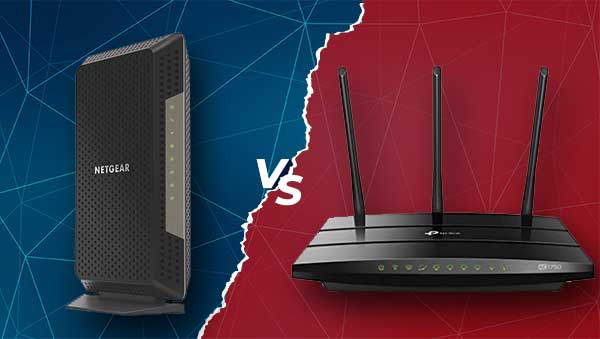There’s one important thing to remember. The internet speed you get is as fast as the speed you’ve subscribed to with your ISP (Internet Service Provider). It can only get lower if there’s heavy traffic on the ISP’s servers or there’s a data cap per your ISP’s policy.
So, will a new router increase internet speed? Yes and no, but getting a new router comes with some benefits, and adding another router to your network can improve network security and connectivity. Also, adding a second router can increase your network’s range, but with a new one, you’ll probably have sufficient range.
CONTENTS
Does a Router Increase Internet Speeds?
Unfortunately, it doesn’t. However, different routers support different speeds. When you have an older router, you probably don’t have the features that support faster wireless frequency bands, and there’s a possibility that your router isn’t compatible with the speed provided by your ISP.
With a newer router, we have different frequency bands we can use. There’s better support for newer devices, and it can probably support faster speeds. You’ll get as much speed as you pay for in your internet subscription plan.
What Does a Router Do?
We’ve determined that it doesn’t increase internet speed unless your previous router was ancient, and it didn’t support the speed your ISP provides. So, what does it do? Well, a router does a complex task of NAT (Network Address Translation).
All the information across networks travels in data packet form. The packet contains the IP address information in its header and the content information in its payload. When we download something, it comes to our device as a file.
However, this file is downloaded in bits, and with every bit is a data packet with the same IP address information. The thing is, that we usually have many devices connected to our home network, and it’s usually a wireless connection.
But, we also have only one IP address on the internet. So, how do the data packets, i.e. file we’re downloading, know where to go? Well, the one IP address is the IP address of our modem. The modem provides internet access to the router, and the router changes the IP address information according to the device that “ordered” the file.
Ergo, the router provides the possibility for each device to have its unique IP address within our home network. Still, our IP address on the internet remains unchanged no matter which device we use.
Difference Between Modem and Router

As we said, the router performs network address translation. So, what does a modem do? The word “modem” is short for modulator/demodulator. It takes analog signals from the wires leading from the ISP to our home and transforms them into digital signals and vice versa.
There are two features of a modem, and they work like this. When we type an address into our browser, the modem takes the data and modulates carrier wave signals to represent that data in analog form.
Then, when we get back the web address, the modem demodulates these analog signals and represents the digital information that was sent to us per our request. This is how a modem works.
So, the key difference is that the router only handles digital signals and routes the information to the devices connected to our network, while the modem provides internet access to the router and modulates/demodulates the signals from analog to digital and vice versa.
Recommended reading:
More Than One Router
Using over one router in your home network can be tricky and it won’t increase your internet speed. The only reasons to use a second router in your home network are:
- Network range: You’ll get another network in your home, and you’ll get a reliable signal on that network. However, it might be better to opt for a mesh network or Wi-Fi extenders in this case.
- More wired connections: An extra router means extra LAN ports, and a wired connection is much more reliable than a wireless one. This is a very good benefit of adding a second router.
- Better security: Having two different networks in your home makes both of them more secure. Also, the LAN traffic and speed of one network can be reserved for a specific purpose, e.g. gaming.
Increasing Speed With Router

So, as we said, adding a second router to your home network can’t improve your internet speed, and if you get a new router that supports the same speed as your current one, there will be no increase.
The only way to get a speed increase is to get a better package with your internet service provider. But, if you’re already subscribed to a great package, and you’re still not getting the speed you were promised, then you should get a new router.
The internet speed sometimes depends on the connection speed of your router. Fortunately, there are so many options available, and if you’re looking to replace your old router and get a better overall connection.
Conclusion
So, will a new router increase internet speed? Yes, it will if it supports a faster connection. No, it won’t if it’s the same as your old one. Having a new router doesn’t mean that you’ll have a faster internet connection.
We need to get a better subscription to get a faster internet connection, and only then can we think of a router that supports that kind of speed. Finally, adding a secondary router doesn’t increase speed, but it comes with other benefits.

Hey, I’m David. I’ve been working as a wireless network engineer and a network administrator for 15 years. During my studies, I also worked as an ISP field technician – that’s when I met Jeremy.
I hold a bachelor’s degree in network engineering and a master’s degree in computer science and engineering. I’m also a Cisco-certified service provider.
In my professional career, I worked for router/modem manufacturers and internet providers. I like to think that I’m good at explaining network-related issues in simple terms. That’s exactly what I’m doing on this website – I’m making simple and easy-to-follow guides on how to install, set up, and troubleshoot your networking hardware. I also review new network equipment – modems, gateways, switches, routers, extenders, mesh systems, cables, etc.
My goal is to help regular users with their everyday network issues, educate them, and make them less scared of their equipment. In my articles, you can find tips on what to look for when buying new networking hardware, and how to adjust your network settings to get the most out of your wi-fi.
Since my work is closely related to computers, servers, and other network equipment, I like to spend most of my spare time outdoors. When I want to blow off some steam, I like to ride my bike. I also love hiking and swimming. When I need to calm down and clear my mind, my go-to activity is fishing.
